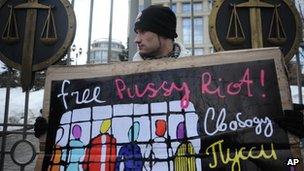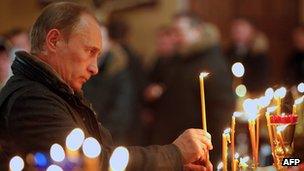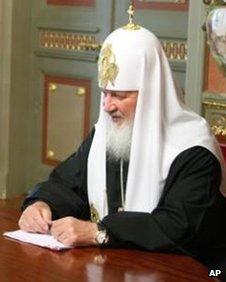Russian Church leader under fire after backing Putin
- Published

Punk band members were charged with hooliganism after staging a "punk prayer" in a Moscow cathedral
The Russian Orthodox Church has lashed out at "anti-clerical forces" and "aggressive liberalism" after a spate of controversies, including an airbrushed official photo of Patriarch Kirill which erased his luxury Swiss watch.
Critics say the Church is paying the price for the Patriarch's support of President-elect Vladimir Putin.
Orthodox Christianity is by far Russia's most popular religion, with around three-quarters of the population naming it as their faith. However, well under 10% attend church regularly.
Even before the gold watch gaffe the Church was in the media spotlight over a lawsuit involving an up-market apartment in Moscow and the tough response to the feminist punk rockers Pussy Riot after their protest in Moscow's main Orthodox cathedral.
'Punk prayer'
Pussy Riot's "punk prayer" took place in the Cathedral of Christ the Saviour, a glittering landmark in the centre of Moscow, on 21 February.
Dressed in bright costumes and ski masks, the women knelt, danced and sang in front of the altar before being hustled away by church officials.
In the version posted on the group's blog, the "prayer" calls on the Virgin Mary to "banish Putin" and accuses the Patriarch of believing in the prime minister rather than God.
A few weeks before the presidential election on 4 March, the Patriarch had hailed Russia's leaders for performing a "miracle of God" in delivering the country from "what it endured in the 1990s".

Orthodox Christmas, 2011: Mr Putin's faith is often on show in the media
He also appeared to distance the Church from the opposition activists campaigning for fair elections, telling worshippers that "Orthodox people do not have it in them to attend rallies", but prefer venerating relics.
The Orthodox Church says it is independent of the Russian state. But it has been staunch in its ideological support for the current leadership, often echoing its criticisms of the West.
And it has received both moral and material support in return. In January 2010, Mr Putin pledged 2bn roubles ($63m; £40m) for the restoration of churches and monasteries.
The closeness of the relationship is often reflected in coverage on state TV of Mr Putin and outgoing President Dmitry Medvedev attending religious services.
Pussy Riot 'sacrilege'
Three members of Pussy Riot were remanded in custody and charged with hooliganism, which carries a maximum sentence of seven years' imprisonment, after conservative Orthodox activists called on the authorities to punish them.
One prominent Orthodox commentator even called for them to be "burnt at the stake".
There was widespread dismay at the women's treatment and the Church's attitude to them, including from some Orthodox Christians.
Hospice charity worker Lidiya Moniava wrote an open letter to the Patriarch urging him to adopt a "Christian attitude" to the women and to stop the "hatred and anger" being vented at them.
The letter was signed by nearly 6,000 people. According to Ms Moniava, more than 1,900 of them were Orthodox Christians and 23 clergy.
Patriarch Kirill was unmoved. He issued a stern rebuke to believers who sought to "justify this sacrilege, to minimise it".

The Church apologised for a doctored version of this photo in which Kirill's luxury watch was erased
He was referring to relics housed in the cathedral, including a nail said to have been used in Jesus's crucifixion.
Embarrassing gold watch
The Church started speaking of a "smear campaign" being waged against the Patriarch.
It appeared to have in mind stories in the media and on the internet alleging that its leader enjoyed luxuries that contravened the vow of poverty he took when he became a monk.
One concerned a lawsuit involving a large flat belonging to him in an exclusive district of Moscow. The lawsuit ended with damages of around $500,000 (£315,000) being awarded to a woman acting on behalf of the Patriarch, while a neighbour's flat was seized by bailiffs.
Another featured a $30,000 Swiss watch that the Patriarch was photographed wearing during a religious service in Ukraine in 2009.
Kirill said the watch was a gift and not part of his attire. He said the photo was a "collage".
But then bloggers posted another photograph, from his website, which had been doctored to remove the watch from his wrist. The reflection of the watch was still clearly visible on the highly polished table.
Twitter users mocked him as "Patriarch of Switzerland and all Watches".
And his press service was forced to issue an apology, admitting a "ridiculous mistake".
Conspiracy theory
The Church says it is the victim of a conspiracy of "anti-clerical forces" and adherents of "aggressive liberalism" motivated by its unflinching opposition to "anti-Christian phenomena, such as the recognition of same-sex marriages".
It also said that it detected an "anti-Russian" element in the campaign against it.
It linked the Pussy Riot protest and the "smear campaign" to a series of physical attacks on clerics and Church property.
The Church has now summoned the faithful to a mass prayer on 22 April in defence of "faith, desecrated relics, the Church and its good name".
Priests were ordered to read out the summons during services on 8 April, Orthodox Palm Sunday.
The Church has also received support from pro-government media.
The state-run channel Rossiya 1 led its flagship weekly current affairs show on Sunday with footage of the Patriarch addressing the congregation in the Cathedral of Christ the Saviour. Once again he attacked the "sacrilege" he said had been committed against its relics - and he held up the relic of Christ's nail.
The critics have hit back.
Writing on politics website Gazeta.ru, columnist Semyon Novoprudsky said that by "becoming part of the political regime", the Church is "killing what remains of its moral authority in the eyes of people of sense and conscience".
He also accused it of using its power to "deliberately sow dissension in the nation".
<link> <caption>BBC Monitoring</caption> <url href="http://www.monitor.bbc.co.uk/" platform="highweb"/> </link> selects and translates news from radio, television, press, news agencies and the internet from 150 countries in more than 70 languages. It is based in Caversham, UK, and has several bureaux abroad.
- Published5 April 2012
- Published14 March 2012
- Published7 January 2012